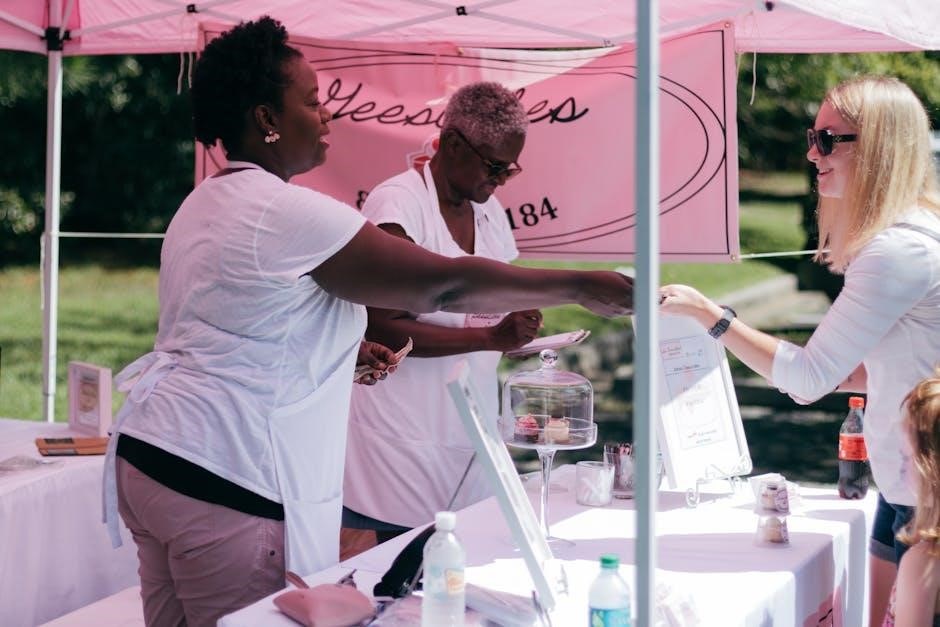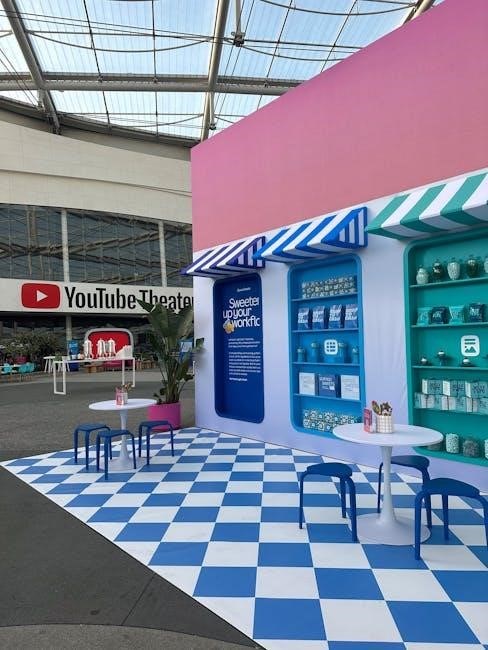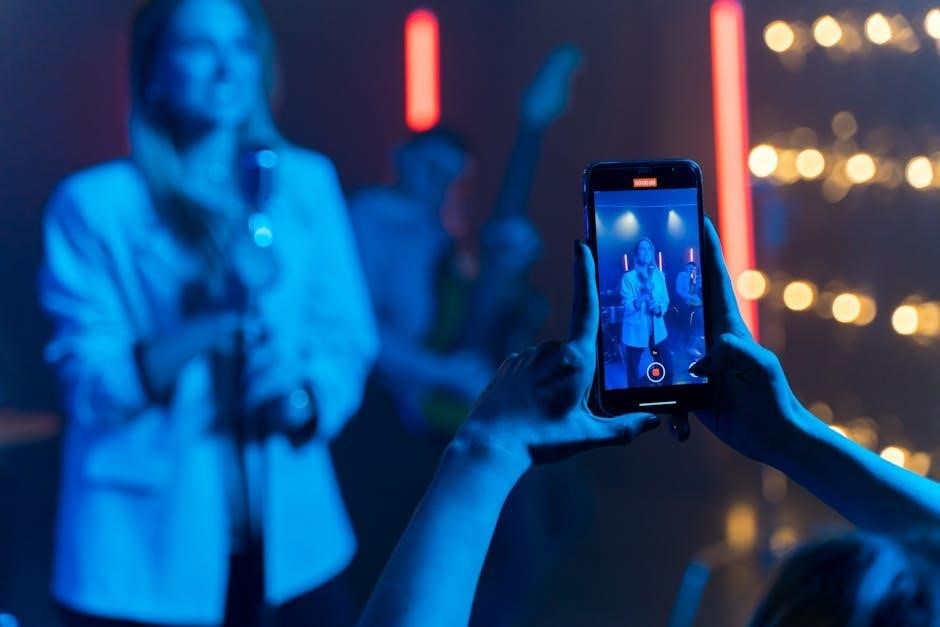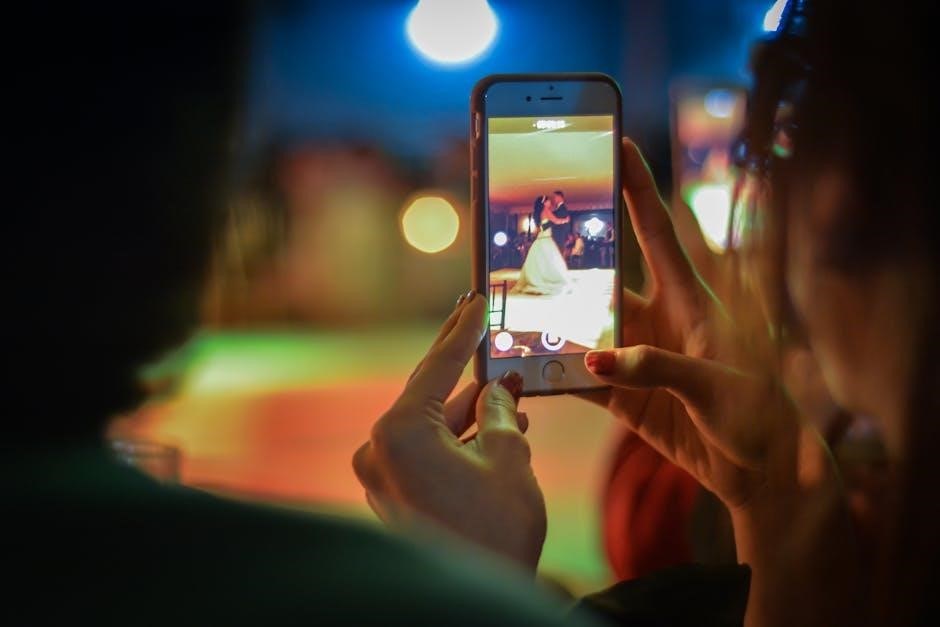
Social media has transformed how events are marketed‚ offering unparalleled reach and engagement. Donna Gilliland’s guide provides expert strategies to leverage platforms like Instagram‚ Facebook‚ and LinkedIn effectively‚ ensuring impactful event promotion and audience connection through tailored content and real-time interactions.
1.1 Understanding the Role of Social Media in Event Marketing
Social media has revolutionized event marketing by offering unprecedented opportunities to connect with audiences globally. It enables real-time engagement‚ boosts brand awareness‚ and drives attendance through targeted campaigns. Donna Gilliland’s guide emphasizes the importance of leveraging platforms like Instagram‚ Facebook‚ and LinkedIn to create engaging content and foster meaningful interactions. By understanding how social media amplifies event promotion‚ marketers can craft strategies that resonate with diverse audiences‚ ensuring maximum impact and measurable results. This approach transforms events into dynamic‚ community-driven experiences that leave a lasting impression.
1.2 Donna Gilliland’s Expertise in Social Media Marketing
Donna Gilliland is a renowned author‚ educator‚ and founder of MOSTraining‚ Inc.‚ specializing in social media marketing and productivity training. Recognized as one of the top women in digital marketing‚ she offers tailored strategies to enhance event promotion. Her work‚ featured in OfficePro magazine and Social Media Examiner‚ highlights her expertise in leveraging platforms like Instagram and Facebook. Donna’s approach combines practical guidance with real-world examples‚ making her a trusted resource for businesses aiming to maximize their online presence and engagement through effective social media strategies.
Developing a Comprehensive Social Media Marketing Plan
A well-structured plan is crucial for successful event marketing. Start by defining clear‚ measurable goals like boosting attendance or brand awareness‚ then tailor strategies to your audience and platforms.
2.1 Defining Clear‚ Measurable Goals
Defining clear‚ measurable goals is the foundation of a successful social media marketing plan. Start by identifying specific objectives‚ such as increasing event attendance or boosting brand awareness. Ensure these goals align with your overall event vision and are quantifiable. For example‚ aim to increase Instagram followers by 20% or achieve a 30% engagement rate on event-related posts. Use Key Performance Indicators (KPIs) to track progress. Consider your target audience’s preferences and behaviors when setting these goals. A well-defined strategy ensures focus and helps measure the effectiveness of your social media efforts. Donna Gilliland emphasizes the importance of actionable‚ results-driven objectives in her guide.
2.2 Identifying Target Audiences for Events
Identifying your target audience is crucial for effective social media event marketing. Begin by analyzing demographic data‚ such as age‚ location‚ and interests‚ to create detailed audience profiles. Consider past event attendees and their engagement patterns to refine your targeting. Use social media insights to understand their preferences and behaviors. Tailor your content to resonate with their needs‚ ensuring your messaging aligns with their expectations. A well-defined audience ensures your campaigns are relevant and impactful. Donna Gilliland highlights the importance of audience analysis in her guide to maximize engagement and achieve event goals effectively.
2.3 Selecting the Right Social Media Platforms
Selecting the right social media platforms is key to maximizing event reach and engagement. Focus on platforms where your target audience is most active. Visual-centric events thrive on Instagram and Facebook‚ while LinkedIn is ideal for professional or B2B gatherings. Twitter excels for real-time updates and interactions. Consider the platform’s features‚ such as Instagram Stories or Facebook Live‚ to enhance event promotion. Donna Gilliland advises aligning platform choice with audience preferences and event goals to ensure effective communication and participation‚ ensuring your message resonates with the right people at the right time.
Key Social Media Platforms for Event Marketing
Instagram‚ Facebook‚ LinkedIn‚ and Twitter are essential platforms for event marketing. Instagram excels with visual storytelling‚ while Facebook builds community. LinkedIn suits professional events‚ and Twitter enables real-time engagement.
3.1 Leveraging Instagram for Event Promotion
Instagram’s visual-centric platform is ideal for event promotion. Donna Gilliland suggests using high-quality images‚ Stories‚ and Reels to captivate audiences. Carousel posts can showcase event highlights‚ while hashtags and geotags increase visibility. Engaging with followers through polls and Q&A stickers fosters interaction. Behind-the-scenes content and sneak peeks build anticipation. Instagram’s features like “Countdown” stickers and “Event” tags help drive attendance. By crafting a compelling visual narrative‚ businesses can create a lasting impression and effectively promote their events‚ aligning with Donna’s strategies for maximizing engagement and reach on the platform.
3.2 Using Facebook to Increase Event Awareness
Facebook remains a powerful tool for event marketing due to its broad reach and engagement features. Donna Gilliland emphasizes creating dedicated Facebook Event pages to centralize details and track RSVPs. Strategies include sharing engaging posts‚ videos‚ and updates to maintain interest. Facebook Groups can expand visibility by connecting with relevant communities. Utilizing Facebook Ads targets specific audiences‚ boosting attendance. Regular updates and interactive content‚ like polls or Q&A sessions‚ keep the audience engaged. Donna also highlights the importance of leveraging Facebook Insights to monitor performance and refine strategies‚ ensuring maximum impact and visibility for your event.
3.3 Maximizing LinkedIn for Professional Events
LinkedIn is ideal for promoting professional events due to its focus on networking and industry engagement. Donna Gilliland recommends leveraging LinkedIn Groups to connect with niche audiences and share event details. Sponsored Content and InMail can target professionals by job title or industry‚ ensuring relevance. Encouraging employees and speakers to share event updates amplifies reach organically. LinkedIn Event pages allow detailed promotion‚ while analytics track engagement. Donna emphasizes the platform’s potential for B2B marketing‚ making it a key tool for establishing credibility and attracting attendees to conferences‚ webinars‚ and corporate events.
3.4 Twitter’s Role in Real-Time Engagement
Twitter excels in fostering real-time engagement‚ making it ideal for live event interactions. Donna Gilliland highlights the platform’s ability to connect attendees and organizers instantly. By leveraging hashtags‚ event-specific trends can be created‚ increasing visibility and encouraging participation. Live-tweeting event highlights‚ hosting Q&A sessions‚ and sharing behind-the-scenes content keeps audiences engaged. Polls and Twitter Chats further enhance interaction‚ while Twitter Analytics provides insights into engagement metrics. Donna emphasizes using Twitter for dynamic‚ spontaneous communication‚ ensuring events stay top-of-mind and foster a sense of community among participants and followers. Its real-time nature makes it a powerful tool for event marketing success.

Content Strategy for Event Marketing
A strong content strategy is vital for event success. Donna Gilliland emphasizes creating engaging visuals‚ crafting compelling captions‚ and utilizing video content to captivate audiences and drive participation effectively.
4.1 Creating Engaging Visual Content
Creating engaging visual content is crucial for capturing attention in event marketing. Donna Gilliland highlights the importance of high-quality images‚ infographics‚ and consistent branding to convey event themes effectively. She recommends using design tools like Canva to craft professional-looking visuals without extensive design experience. Incorporating event-specific hashtags and eye-catching graphics can enhance visibility and encourage sharing. Visual storytelling‚ including behind-the-scenes content‚ can also deepen audience connection. By aligning visuals with the event’s messaging‚ marketers can create a cohesive and memorable experience that resonates with their target audience and drives engagement across social media platforms.
4.2 Crafting Compelling Captions and Descriptions
Crafting compelling captions and descriptions is essential for driving engagement and interest in events. Donna Gilliland emphasizes the importance of clear‚ concise‚ and emotionally appealing language to capture attention. She suggests using emojis and hashtags strategically to enhance visibility and encourage sharing. Descriptions should highlight event benefits‚ key takeaways‚ and unique selling points. By combining storytelling with a strong call-to-action‚ marketers can motivate audiences to participate. Donna also advises tailoring language to the platform and audience‚ ensuring messaging resonates and drives action‚ whether it’s ticket sales‚ registrations‚ or social media buzz around the event.
4.3 Utilizing Video Content for Promotion
Video content is a powerful tool for event promotion‚ offering dynamic storytelling and emotional connection. Donna Gilliland highlights the importance of creating engaging‚ high-quality videos that showcase event highlights‚ speaker previews‚ or sneak peeks. Platforms like Instagram Reels and Facebook Videos are ideal for short‚ impactful clips. She recommends using captions and hashtags to enhance discoverability. Behind-the-scenes content can build anticipation‚ while live videos foster real-time engagement. Donna emphasizes the need for a clear call-to-action‚ such as registering or sharing the video‚ to maximize reach and drive event participation effectively.

Engagement and Interaction Techniques
Engagement is key to successful event marketing. Donna Gilliland suggests using interactive elements like polls‚ Q&A sessions‚ and contests to foster audience participation and build excitement.
5.1 Building a Community Around Your Event
Building a community around your event fosters loyalty and engagement. Donna Gilliland recommends creating dedicated social media groups or forums where attendees can connect‚ share experiences‚ and discuss event-related topics. Consistent interaction through comments‚ messages‚ and posts helps build trust and excitement. Encouraging user-generated content‚ such as event-related stories or photos‚ strengthens community bonds. Leveraging hashtags and tagging features ensures visibility and inclusivity. By nurturing this community‚ you create a loyal audience that actively participates and promotes your event‚ turning attendees into ambassadors who champion your brand long after the event concludes.
5.2 Encouraging User-Generated Content
Encouraging user-generated content (UGC) is a powerful way to amplify your event’s reach and authenticity. Donna Gilliland suggests creating branded hashtags and offering incentives‚ such as contests or shoutouts‚ to motivate attendees to share their experiences. Highlighting UGC on your official channels fosters a sense of community and trust. Encourage attendees to post photos‚ videos‚ or testimonials about the event. Providing creative prompts or challenges can also spark engagement. By leveraging UGC‚ you not only gain free promotion but also build a library of relatable content that resonates with your audience and enhances your event’s credibility.
5.3 Hosting Live Q&A Sessions
Hosting live Q&A sessions is a dynamic way to engage your audience in real-time‚ fostering direct interaction and building trust. Donna Gilliland recommends using platforms like Instagram Live‚ Facebook Live‚ or Twitter Spaces to connect with attendees. These sessions can be used to preview event highlights‚ address attendee questions‚ or provide exclusive insights. Promote the sessions in advance to maximize participation‚ and encourage attendees to submit questions beforehand. By hosting live Q&A sessions‚ you create a sense of urgency and exclusivity‚ keeping your audience engaged and invested in your event before‚ during‚ and after it takes place.
Analytics and Measuring Success
Tracking metrics like engagement rates‚ hashtag performance‚ and attendee demographics helps gauge event success. Donna Gilliland emphasizes using analytics tools to refine strategies and prove ROI.
6.1 Tracking Key Performance Indicators (KPIs)
Monitoring KPIs is crucial for measuring event success. Donna Gilliland highlights metrics like engagement rates‚ website traffic‚ and hashtag usage to assess campaign effectiveness. Tools such as Instagram Insights and Facebook Analytics provide detailed data‚ enabling marketers to track attendee interactions and content performance. By focusing on these metrics‚ businesses can refine their strategies and optimize future campaigns. KPIs also help demonstrate ROI‚ ensuring resources are allocated effectively. Gilliland emphasizes the importance of aligning KPIs with event goals‚ such as attendance or brand awareness‚ to accurately evaluate outcomes and make data-driven decisions.
6.2 Analyzing Engagement Metrics
Engagement metrics reveal how audiences interact with your content‚ such as likes‚ comments‚ shares‚ and hashtag usage. Donna Gilliland suggests using tools like Instagram Insights and Facebook Analytics to track these metrics. High engagement indicates content resonance‚ while low engagement may signal a need for strategy adjustment. Metrics like click-through rates and saves can also measure content effectiveness. By analyzing engagement patterns‚ marketers can identify what drives audience interaction and refine their strategies accordingly. This data is essential for optimizing content performance and ensuring campaigns align with event goals.
6.3 Monitoring Hashtag Performance
Monitoring hashtag performance is crucial for gauging event visibility and reach. Donna Gilliland recommends tracking hashtag usage across platforms to measure popularity and related conversations. Tools like Instagram Insights and Facebook Analytics provide valuable data on hashtag engagement. By analyzing which hashtags drive the most interactions‚ marketers can refine their strategy to enhance campaign impact. Consistent use of branded hashtags helps build recognition and simplifies tracking. Regular monitoring ensures hashtags remain relevant and effective‚ enabling adjustments to better align with audience preferences and event objectives.

Case Studies and Real-World Examples
Donna Gilliland’s guide highlights successful social media campaigns‚ offering insights into real-world strategies and their impact on event marketing. These examples demonstrate how effective tactics drive results.
7.1 Successful Social Media Campaigns for Events
Donna Gilliland’s guide showcases real-world success stories‚ highlighting campaigns that effectively leveraged platforms like Instagram‚ Facebook‚ and LinkedIn. For example‚ her strategies on creating engaging visuals and using hashtags drove significant attendance increases. One notable campaign utilized Instagram Stories and Reels to build excitement‚ achieving a 40% boost in event registrations. Another example focused on LinkedIn for professional events‚ resulting in a 25% rise in attendee engagement. These case studies demonstrate how tailored content and platform-specific tactics yield measurable results‚ offering actionable insights for marketers.
7.2 Lessons Learned from Past Event Marketing Efforts
Donna Gilliland’s insights reveal key lessons from past campaigns‚ emphasizing the importance of clear goals and audience understanding. She highlights the need for consistent branding and timely engagement to maintain momentum. Overloading platforms with content can diminish impact‚ while underutilizing visuals and video leads to missed opportunities. Gilliland also stresses the value of analytics to refine strategies and the importance of adaptability in response to audience feedback. These lessons underscore the balance between creativity and data-driven decision-making‚ ensuring future campaigns are more effective and engaging.
Tools and Resources for Social Media Event Marketing
Donna Gilliland’s guide highlights essential tools like Canva for design‚ social media management platforms for scheduling‚ and video editing tools to create engaging visual content‚ ensuring polished and professional event promotion.
8.1 Canva: A Design Tool for Non-Designers
Canva is a user-friendly design platform perfect for non-designers‚ offering pre-designed templates and drag-and-drop features. Donna Gilliland highlights its versatility for creating professional-looking social media graphics‚ event invitations‚ and promotional materials. With customizable options‚ it empowers marketers to craft visually appealing content without advanced design skills. Real-time collaboration tools also make it ideal for teams working on event campaigns. Canva’s accessibility and creative flexibility make it an essential resource for elevating event marketing visuals‚ ensuring consistency and impact across all social media platforms.
8.2 Social Media Management Platforms
Social media management platforms streamline event marketing efforts by consolidating tasks like scheduling posts‚ monitoring engagement‚ and analyzing performance. Tools like Hootsuite and Buffer enable marketers to manage multiple accounts from a single dashboard‚ ensuring consistent messaging. Donna Gilliland emphasizes their role in saving time and enhancing efficiency. These platforms also offer built-in analytics to track campaign success‚ helping refine strategies. By automating routine tasks‚ they allow marketers to focus on creative and strategic aspects of event promotion‚ ensuring a cohesive and impactful online presence without the need for advanced technical skills.
8.3 Video Editing Tools for Content Creation
Video editing tools are essential for creating engaging content in event marketing. Donna Gilliland highlights tools like Canva‚ which offers intuitive video editing features for non-designers. Professional-grade tools such as Adobe Premiere Pro and Final Cut Pro provide advanced capabilities for polished‚ high-quality videos. These tools enable marketers to craft compelling stories‚ showcasing event highlights or sneak peeks‚ to captivate audiences. By leveraging these platforms‚ marketers can produce visually appealing content that aligns with their branding and resonates with their target audience‚ enhancing overall event promotion and engagement strategies effectively.
Future Trends in Social Media Event Marketing
Digital evolution is driving social media event marketing trends‚ with a focus on virtual and hybrid events‚ AI integration‚ and personalized attendee experiences.
9.1 The Rise of Virtual and Hybrid Events
The rise of virtual and hybrid events has revolutionized the way we connect and engage audiences. Donna Gilliland emphasizes the importance of adapting to this trend‚ leveraging platforms like Zoom and Skype for seamless virtual interactions. Hybrid events‚ combining in-person and online participation‚ offer flexibility and broader reach. These formats enhance accessibility‚ reduce costs‚ and provide innovative ways to engage attendees. Donna highlights the need for tailored strategies to maintain engagement‚ such as interactive Q&A sessions and personalized content. As technology advances‚ virtual and hybrid events will continue to dominate‚ offering dynamic and inclusive experiences for global audiences.
9.2 Integrating AI into Event Marketing Strategies
Integrating AI into event marketing strategies is a game-changer‚ offering personalized experiences and data-driven insights. Donna Gilliland highlights how AI tools can analyze audience behavior‚ enabling tailored content and campaigns. Chatbots powered by AI enhance attendee engagement‚ providing instant responses and improving overall satisfaction. Predictive analytics help forecast event outcomes‚ allowing marketers to refine strategies in real-time. AI also automates repetitive tasks‚ freeing up time for creative planning. By embracing AI‚ marketers can deliver more impactful‚ efficient‚ and engaging events‚ setting new standards in the industry.
9.3 The Importance of Personalized Experiences
Personalized experiences are crucial for engaging attendees and creating memorable events. Donna Gilliland emphasizes the importance of tailoring content and interactions to individual preferences‚ fostering deeper connections. By leveraging data and analytics‚ marketers can segment audiences and deliver targeted campaigns. Personalization enhances attendee satisfaction‚ encouraging loyalty and advocacy. Tools like AI-driven recommendations and dynamic content further amplify these efforts‚ ensuring each participant feels valued. In a competitive landscape‚ personalized experiences set events apart‚ driving higher engagement and long-term impact‚ aligning with Donna’s strategies for impactful social media event marketing.
Donna Gilliland’s guide underscores the power of social media in event marketing‚ offering strategies to enhance engagement‚ measure success‚ and adapt to future trends effectively.
10.1 Summarizing Key Takeaways
Donna Gilliland’s guide emphasizes the importance of a structured social media plan‚ leveraging platforms like Instagram‚ Facebook‚ and LinkedIn for event promotion. She highlights the need for clear goals‚ engaging visual content‚ and real-time interaction. Tools like Canva and video editing software are essential for creating compelling visuals. Analytics and KPIs are crucial for measuring success. Donna also stresses the value of community-building‚ user-generated content‚ and personalized experiences. Her expertise underscores the evolution of virtual and hybrid events‚ the integration of AI‚ and the significance of continuous learning in adapting to future trends in social media event marketing.
10.2 Encouraging Continuous Learning and Adaptation
Donna Gilliland’s guide underscores the importance of staying updated with trends like virtual events‚ AI integration‚ and personalized experiences. She advocates for continuous learning through resources like her Social Media Event Marketing Guide and online workshops. By embracing tools like Canva and video editing software‚ marketers can adapt to evolving platforms. Donna’s expertise encourages professionals to experiment with new strategies‚ engage with communities‚ and analyze metrics to refine their approaches. Her insights empower marketers to remain agile‚ ensuring their event marketing efforts stay relevant and impactful in a rapidly changing digital landscape.

Additional Resources
Explore Donna Gilliland’s Social Media Event Marketing Guide for comprehensive insights. Additionally‚ her articles‚ webinars‚ and online courses offer practical tips and advanced strategies for event professionals;
11.1 Recommended Reading by Donna Gilliland
Donna Gilliland’s Social Media Event Marketing Guide is a cornerstone resource‚ offering practical strategies for leveraging platforms like Instagram‚ Facebook‚ and LinkedIn. Her articles in OfficePro magazine provide actionable tips on creating engaging content and measuring success. Additionally‚ her video tutorials and webinars cover essential tools like Canva for design and social media management platforms. These resources are tailored for both professionals and newcomers‚ ensuring a comprehensive understanding of event marketing in the digital age. Gilliland’s accessible style makes complex strategies easy to implement‚ making her materials indispensable for anyone in the field.
11.2 Online Courses and Workshops
Donna Gilliland offers tailored online courses and workshops‚ focusing on social media strategy‚ content creation‚ and engagement techniques. Her webinars and live sessions provide hands-on training‚ covering tools like Canva and social media management platforms. Participants learn to create effective campaigns‚ measure success‚ and adapt to industry trends. These interactive sessions are designed for both beginners and advanced marketers‚ ensuring practical‚ real-world applications. Gilliland’s expertise‚ as featured in OfficePro and other platforms‚ makes her courses a valuable resource for mastering social media event marketing in a dynamic digital landscape.
11.3 Joining Social Media Communities
Joining social media communities enhances networking and learning opportunities in event marketing. Donna Gilliland recommends engaging in groups on platforms like LinkedIn and Facebook‚ where professionals share insights and strategies. These communities provide access to exclusive resources‚ case studies‚ and real-time feedback. By participating in discussions‚ marketers can stay updated on industry trends and best practices. Gilliland’s own social media groups offer valuable connections and practical advice‚ fostering collaboration and innovation. Active involvement in these communities helps marketers refine their skills and stay competitive in the evolving landscape of social media event marketing.